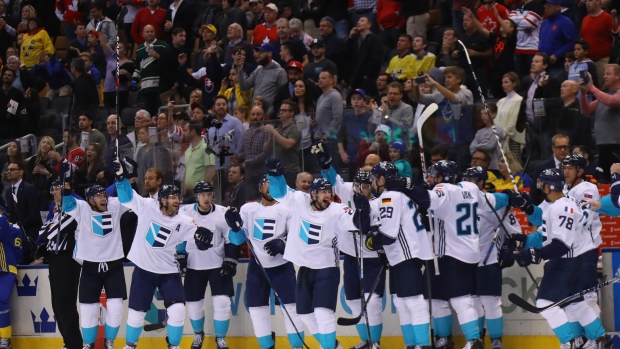Sep 25, 2016
Undaunted Europe on verge of making history
For a team that has none of its own, Team Europe - a hodgepodge crew made up of players from eight countries - is on the verge of making history with a berth in the World Cup of Hockey final, writes Kristen Shilton.

TORONTO - It was 13 months ago that Ralph Krueger, ex-Edmonton Oilers coach and chairman of Southampton FC, was issued an intriguing challenge: rejoin the hockey world for the World Cup as bench boss of Team Europe. It would be a team with no past, and possibly no future, but Krueger accepted anyway.
Fast forward to early September and Krueger’s hodgepodge club with players from eight countries averaged a tournament-high 30.3 years of age. In pre-tournament play, Europe was pummeled 11-4 by Team North America in its first two games, a sure sign this experiment wasn’t long for the World Cup.
But the patchwork crew never lost faith in itself - not after the early missteps and not after a 4-1 loss to Canada in the round robin. And not even late in the third period of Sunday’s semifinal, when their 2-1 lead over Sweden evaporated with a point shot from Erik Karlsson that suddenly had the game tied 2-2 and headed to overtime.
Tomas Tatar needed only 3:43 of the extra frame to give Europe a 3-2 victory and keep their improbable run to the final – against Canada – alive.
“Tomas stepping up with his spirit today…he created that whole OT goal,” Krueger said. “When you see that fight on the wall and against those boys that were a lot bigger than him, that’s where it was all initiated and it ends up in the net. We just continually find ways to do that and that’s the beauty of this team.”
They’re not flashy or fancy or particularly feisty, but Europe proved Sunday that they’re savvier than most – especially those who dismissed them early on. Against the tight-checking Swedes, Europe waited them out in a scoreless first period and then gave up the first goal early in the second period, an easy rebounder to Niklas Backstrom off goaltender Jaroslav Halak at 2:31.
Then Europe made its move. While playing four-on-four, Marian Gaborik deflected a pass from Christian Ehrhoff on net that trickled between the legs of goaltender Henrik Lundqvist and tied the game, 1-1, late in the period. Twelve seconds into the third, Lundqvist fell off balance while failing to glove a shot from Tatar and the Detroit Red Wings forward was there to flip the puck back into the net.
“It’s a really short tournament; there’s game after game,” Tatar said. “I was hoping (I was) going to get an opportunity to sway one game and I’m lucky it happened today.”
Karlsson’s shot late in the third deflected off a defender and past Halak to tie the game and send the affair to OT, where Tatar did exactly what he did on his first goal – chase the play down until the end.
“I think it’s just the beauty of the locker room,” Tatar said of not losing focus. “We are having lots of fun, for sure, and we are helping each other on the ice. So far, it’s been great. We just said, ‘We have to calm down and play our game.’”
Exactly what Europe’s game was going to be was forced to evolve on the go. With no history of playing together internationally or any previous systems to fall back on, Europe took its early lumps and learned from them, showcasing the veteran smarts that have powered them to the final.
“We came in with a different mentality in the two first games against the young kids,” said Franz Nielsen. “We saw right away we can’t play that way. Everyone could see right away we had to change our game. We’re playing simple, playing good defensively. For sure, we’re getting some timely saves from (Halak); you need that in a tournament like this. We do have the talent to make teams pay when they make mistakes.”
The final stage of Europe’s journey is a best-of-three showdown with Canada, as David-vs.-Goliath as a hockey tournament’s end could be. But whatever the outcome, Kruger hopes that won’t be the end of his group’s impact. Back in Slovenia or France or Austria, the finale is about more than who gets a trophy.
“I’m so pleased these peripheral countries in the world of hockey have had an opportunity to compete with the best in the world for the first time in their lives and to truly believe in being competitive on the way to a semifinal,” Krueger said. “And then the overtime showed the belief in the group to get to the final and that’s not possible when these players show up alone at tournaments.
“The pride in that group right now is large. We hope that a few young children back in those countries get inspired by what we do and become great NHL players in 10 years or 12 years. And if that happens when I’m old and retired, I hope that it was a part of this tournament that did that.”

